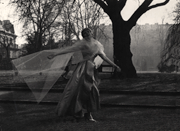Considered to be among the best Slovenian films ever made (that, according to author and Slovenian film and culture scholar Joseph Valencic, often ranks first in national film polls), maverick filmmaker Bostjan Hladnik’s dense and atmospheric Dance in the Rain finds greater kinship with the experimental narrative, fragmentation, and interiorization of Erik Lochen’s The Hunt than with the advent of the French new wave (an association often cited for having worked as an assistant to Claude Chabrol), where anxieties and desires are revealed in the strangeness of projected mental landscapes. A portrait of a disintegrating relationship between the mercurial Peter (Miha Baloh) a struggling, indecisive painter, and his insecure older lover, a stage actress named Marusa (Dusa Pockaj), their increasing sense of desolation is reflected through a repeating series of familiar, yet increasingly alienating places of encounter: Peter’s unkempt room at a derelict boarding house where neighbors often spy through unpatched holes in the door; the silhouette of an elusive woman from a window, a bar where Peter and Marusa meet for a drink, and where Marusa’s devoted co-worker (Ali Raner) has starting visiting in an attempt to win over her affection, a restaurant where Peter shows his cruelty towards Marusa in order to drive her away. Hladnik’s use of interweaving dream sequences and exaggerated sounds to convey heightened emotional states serve to increasingly blur the bounds between reality and fantasy, where patterns of recurrence reflect not only the inescapable truth that exists beneath the characters’ strained conversations and consuming introspection, but also prescribes the corrosive cycle of their doomed love.
© Acquarello 2008. All rights reserved.
